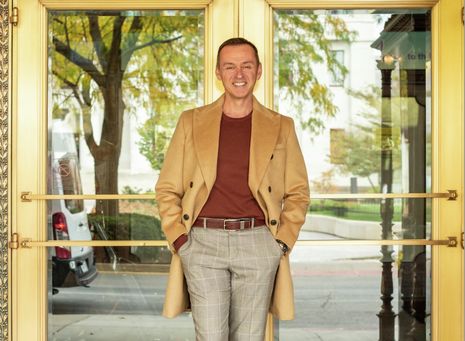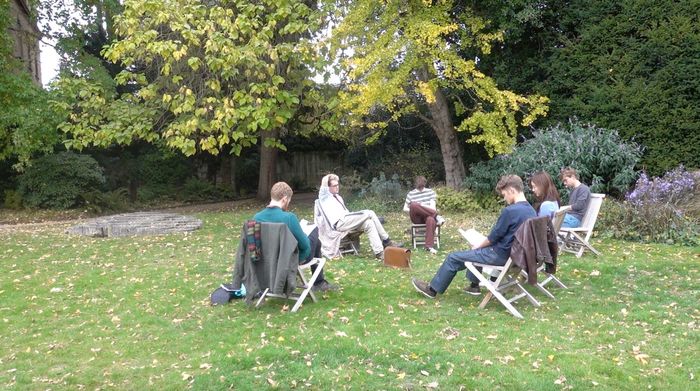Meet the man behind The Addams Family musical
As she directs the ADC production, Kate Woodman gets some pointers from the show’s composer

Andrew Lippa comes with more than a sprinkle of stardust – an influential and prolific figure in theatre, the multi-award winning writer of musicals including, of course, The Addams Family: he has it in bucket-loads! As a superfan of his work in general and The Addams Family in particular, alongside currently directing Addams at the ADC, I was simultaneously very excited and extremely nervous to interview one of Broadway’s greats, but Andrew was gracious, funny, and passionate about his art. Phew.
Despite a childhood background hearing music played in the synagogue, Andrew didn’t learn piano until the age of 14, and only appeared in his first musical – The Pajama Game – in high school. There he learnt “how a musical works” and began his now 45-year love affair with musical theatre. He began his career writing Wild Party, which remains a favourite of his (though he acknowledges he “loves all his children”). At that point in his career, no-one was looking for him to write a musical, and he just wanted to write something that thrilled and excited him. Its success (it was nominated for 13 Drama Desk awards in 2000) gave him the foundation on which to build his life in musical theatre.
“He does contribute to ‘a kind of soul healing’”
To continue just as passionately with his career in musical theatre – Andrew currently has seven full length projects coming to fruition – I wondered what keeps him motivated. It felt very personal as he spoke about how much he loves spending his days in collaboration with other creatives, and his own internal dialogues with his characters. He considers what they might want, what they might do, and gradually builds a musical from those discussions. He describes it as “silly” and “a little unmoored,” but also joyous and exciting. In tandem with that creative process, it is what musical theatre brings: that “combination of art forms from design, dance, music, storytelling, and language” with the added element of live performance, that he continues to find incredibly fascinating.
There is such enthusiasm in the way Andrew speaks about theatre, and I think all budding actors and creatives can relate to his understanding that while, as he says, he doesn’t “make buildings or sew people up after an accident,” he does contribute to “a kind of soul healing”. That could be something funny or deeply moving or anything in between, but what it does is “give people opportunities to bring their feelings into the room and see other people go through things that they can recognise as true”.
“Play honest beats. They are people trying to get by”
The importance of empathy came across strongly again when we discussed the significance of the arts in education. Andrew sees performance as giving young people the opportunity to step into a “new reality, new people, to learn more about themselves”. This opening a door to empathy and exploration for performer, creative and audience member felt like a validation for all of us trying to make our way in this sometimes difficult and demanding industry.
As a new director of The Addams Family, I was interested in the message behind a musical but Andrew was clear that the theme lies underneath the story – “you don’t write theme, you write character, story and plot”. He described musical theatre as a long form because it involves “contact, character, story and time,” with the attraction to a project being based on his taste and whether he wants to live with these characters for several years. The Addams Family brought its own set of challenges, in particular the fact that audiences have varying degrees of knowledge and expectation, but the musical is a new beginning, they now sing! His decision to open with 16 bars from the TV show allows the audience to settle in and enjoy that starting point, and from then on its full Andrew!
“You don’t write theme, you write character, story and plot”
Comedy, of course, is a strong element of the production but Andrew also highlights the more emotional aspects and the importance of enjoying the morbidity of this unconventional family, but also recognising and feeling that they are real: “Play honest beats. They are people trying to get by”. They are characters who are adjusting to and embracing new situations and difficult emotions, who want things “deeply and go after it with love and passion,” and the audience know that is real and is connects with them. One of his favourite moments is the final song, ‘Move Towards the Darkness’. It was fascinating to hear Andrew speak about this, and how he based it on the idea from American writer Joseph Campbell that the cave you fear to enter holds the treasure you seek. The members of the Addams family know this and understand that “only at our lowest can we rise above”, as well as the importance of being open to the new and not closing yourself off – even if that means exploring the deeply sad. The fact that this moment is articulated by Lurch, a character who is neither dead or alive, highlights both the emotion and comedy. It was such a privilege to gain a small insight into the amount of thought and passion that goes into each element of a musical.

Booze and bands: a look ahead to Brassed Off
I couldn’t let the interview end without asking, on behalf of all us hopeful actors and auditionees, what he is looking for when reviewing tapes and auditions. He hopes each actor will “illuminate [the material] in a certain way,” creatively interpreting the piece he has created. Beyond careful preparation and digging deeply, bring your interpretation and seek to be the “spark” they are looking for.
There is a fantastic practicality in Andrew’s advice, so I’ll end with two more pieces of guidance – “musicals don’t happen if people don’t do them” and “play it honestly”.
 News / Judge Business School advisor resigns over Epstein and Andrew links18 February 2026
News / Judge Business School advisor resigns over Epstein and Andrew links18 February 2026 News / Gov grants £36m to Cambridge supercomputer17 February 2026
News / Gov grants £36m to Cambridge supercomputer17 February 2026 News / Union speakers condemn ‘hateful’ Katie Hopkins speech14 February 2026
News / Union speakers condemn ‘hateful’ Katie Hopkins speech14 February 2026 News / CUCA members attend Reform rally in London20 February 2026
News / CUCA members attend Reform rally in London20 February 2026 News / Right-wing billionaire Peter Thiel gives ‘antichrist’ lecture in Cambridge6 February 2026
News / Right-wing billionaire Peter Thiel gives ‘antichrist’ lecture in Cambridge6 February 2026









